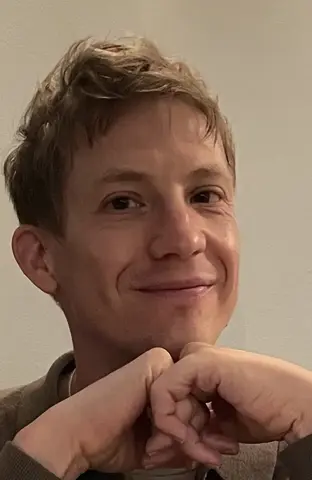Andreas Folkers
andreas.folkers@uni-erfurt.deDistinguished Fellow (Max Weber Centre for Advanced Cultural and Social Studies)
Office hours
nach Vereinbarung
Visiting address
Max-Weber-Kolleg für kultur- und sozialwissenschaftliche Studien
C19 – Forschungsbau „Weltbeziehungen“
Max-Weber-Allee 3
99089 Erfurt
Mailing address
Universität Erfurt
Max-Weber-Kolleg für kultur- und sozialwissenschaftliche Studien
Postfach 90 02 21
99105 Erfurt

Personal Information
Andreas studied Philosophy and Social Sciences at the Goethe University Frankfurt and the New School for Social Research, New York. From 2011 to 2018 he was research associate at the Sociology Department of the Goethe University Frankfurt and received a PhD stipend from the German National Academic Foundation (2011-2014). He defended his PhD in Sociology at the Goethe-University in 2017. After that he worked as a post-doc at the Sociology Department at the Justus-Liebig University Giessen (2018-2024). During his time in Gießen he was PI of two research projects on “Symbiotic Collectives” funded by the Volkswagen Foundation (2018-2020) and on climate risks in finance (2020-2024) funded by the German Research Foundation (DFG). He held several fellowships and visiting scholarships at the New School in 2013, the Max-Weber Centre in Erfurt (2018, 2024-2025), the London School of Economics (2022), the Institute for Advanced Study in Princeton (2022-2023). In 2023 he received the Research Award of the Justus-Liebig-University Gießen for his habilitation project “Fossil Modernity”. Since 2024 he is member of the Research Council of the Institute for Social Research, Frankfurt (IfS). Starting in 2025 he will be a Marie Curie Fellow at the IfS and Columbia University, New York.
Research Project
Fossil Modernity. A Natural History of the Present.
My book project examines the rise, fall, and afterlife of 'fossil modernity'. It analyses and theorizes modern societies from the vantage point of their most important resources: coal, oil, and gas. This allows for a thorough redescription of modernity that goes against the grain of traditional modernity theory. Modernity, presumably the epoch of the new, turns out to depend on something altogether unmodern, old, prehistoric even, that makes it tick, but utterly undermines it. By the same token, modernity itself has become a fossil. It appears to be outdated and obsolete. But it does not simply disappear. Rather, it is materially preserved in fossil residuals like CO2, plastic waste, and toxic petrochemicals that will shape the distant future of the earth. Fossil modernity is not only the fossil-fueled high-modernity that sometimes seems to be, mistakenly, to be a thing of the past, and which we are determined to leave behind. Fossil modernity is also our ecological future, that which is still to come – weather we like it or not.
Research Interests
Critical Theories, Science and Technology Studies, Sociology (political, economic, environmental), Biopolitics, Infrastructure, Energy
Publications (Selection)
- Folkers, Andreas 2024: Risking carbon capital: Reporting infrastructures and the making of financial climate risks, in: Economy & Society, 53(3), 504-526.
- Folkers, Andreas 2024: Calculative futures between climate and finance: A tragedy of multiple horizons, in: Sociological Review, doi.org/10.1177/00380261241258832
- Folkers, Andreas und Sven Opitz 2022: Fixing the symbiotic planet. Climate change, microbial metabolism, and the quest for the low-carbon cow, in: Social Studies of Science 52(3), 330-352.
- Folkers, Andreas 2022: Nach der Nachhaltigkeit. Resilienz und Revolte in der dritten Moderne, in: Leviathan. Berliner Zeitschrift für Sozialwissenschaften 50(2), 239-262.
- Folkers, Andreas 2021: Fossil Modernity. The Materiality of Acceleration, Slow Violence, and Reclaimed Temporalities, in: Time & Society 30(2), 223-246.
- Folkers, Andreas 2020: Air-appropriation. The imperial origins and legacies of the Anthropocene, in: European Journal of Social Theory 23(4), 611-630.
- Folkers, Andreas 2019: Freezing time, preparing for the future. The stockpile as a temporal matter of security, in: Security Dialogue 50(6), 493-511.
- Folkers, Andreas 2018: Das Sicherheitsdispositiv der Resilienz. Katastrophische Risiken und die Biopolitik vitaler Systeme, Frankfurt am Main und New York: Campus.
- Folkers, Andreas 2017: Politik des Lebens jenseits seiner selbst. Für eine ökologische Lebenssoziologie mit Deleuze und Guattari, in: Soziale Welt 68(4), 365-384.
- Folkers, Andreas 2017: Existential Provisions – The Technopolitics of Public Infrastructure, in: Environment and Planning D: Society and Space 35(5), 855-874.
- Folkers, Andreas 2017: Continuity and catastrophe: Business continuity management and the security of financial operations, in: Economy and Society 46(1), 103-127.
- Folkers, Andreas 2016: Daring the Truth: Foucault, Parrhesia and the Genealogy of Critique, in: Theory, Culture & Society 33(1), 3-28.
- Folkers, Andreas und Thomas Lemke (Ed.) 2014: Biopolitik. Ein Reader, Berlin: Suhrkamp.
